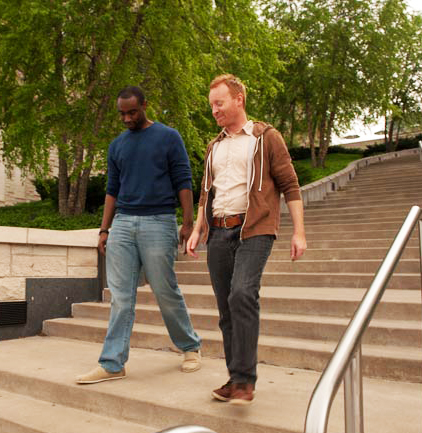Anxiety & Depression

What Lifestyle Changes are Recommended for Anxiety and Depression?
Lifestyle changes are simple but powerful tools in treating depression and anxiety, and they are an essential component of an integrated approach to treatment. In some cases, lifestyle changes alone can help depression or relieve anxiety, so it makes sense to start with them right away. But if you are suffering from moderate to severe depression or anxiety, also seek professional help right away. And if you don’t see relief from symptoms of mild depression in a few months, likewise seek professional help.
Lifestyle changes that can help include the following.
Exercise
Exercise is the most important place to start. Numerous well-designed studies have found exercise to be effective in elevating mood and reducing symptoms of depression. As for anxiety, many research studies have also found an improvement in anxiety symptoms with increased physical activity, especially mindful movement, such as yoga, tai chi, and qigong.
Exercise stimulates the body to produce serotonin and endorphins, which are chemicals in the brain (neurotransmitters) that help depression. But that only partially explains the positive impacts of exercise on depression.
Participating in an exercise program can:
 ✔ Increase self-esteem
✔ Increase self-esteem
✔ Boost self-confidence
✔ Create a sense of empowerment
✔ Enhance social connections and relationships
All of these things have a positive impact on a depressed or anxious individual.

Start a walking program
Walking just 30 minutes a day can significantly reduce your risk for major chronic diseases, including anxiety and depression. Read these tips to get started.
 Use the following ideas to start your own walking program.
Use the following ideas to start your own walking program.
- Wear the pedometer for a few days and see how many steps you average.
- Set a daily goal and work (or walk) up to it. A good goal is to increase your average daily steps gradually so that you get used to the increased distance. Recommendations vary on how fast to increase steps. Anywhere from 500-2,000 steps a week is reasonable.
- Record your daily steps in a log or notebook.
There are many ways to increase your daily steps:
- Choose a more distant parking place
- Take the stairs
- Walk over to a friend's dorm room or a colleague's office instead of using the phone or e-mail
- Walk the dog
- Walk with a friend each day
Find ways to walk even during the winter months or other inclement weather.
- Walking in the malls
- Local school track or fitness center
- 3-5min "walk breaks" during study time/work/etc
If you experience pain or discomfort, check with your primary care provider.
Remember, it takes about six months to "lock-in" a new behavior. Think of your walking program as a permanent change in your behavior. If you maintain your walking program for a minimum of six months, you are much more likely to maintain this change long-term.
Diet
The brain is one of the most metabolically active parts of the body and needs a steady stream of nutrients to function. A poor diet may not provide the nutrients necessary to produce neurotransmitters and may provoke symptoms of anxiety or depression.
- Follow specific dietary guidelines.Eat a healthy diet. Fill your plate with fresh, whole foods; drink plenty of water; get enough calcium; and keep trans fats low to follow in step with current dietary guidelines.
- Take care of your gut. Taking supplemental probiotics with two or more live cultures (for example lactobacillus and bifidobacerium) and eating fermented foods, such as yogurt and miso, help support a healthy digestive system.
- Cut the sweetened beverages. Sweetened tea, soda, and fruit punch may contribute to depression. A recent study found that people who drink four or more cups or cans of soda every day are 30% more likely to be depressed than people who did not drink soda. The same study reported that those who drank unsweetened coffee each day (either regular or decaf) reported less depression than non-coffee drinkers.
- Try going decaf. Because other studies show that long-term use of caffeine has been linked with anxiety, decaffeinated coffee may be the best choice for some. If you are a regular caffeine user, cutting back gradually will be best tolerated.
Alcohol
Depressed populations have more problems with alcohol use even though alcohol itself is a depressant. Alcohol use may be a way that individuals ‘self-medicate,’ trying to numb the pain of their depression.
People suffering from depression should stop drinking alcohol. If alcohol abuse underlies the depression, it is critical that it be addressed directly.
Sleep
Poor sleep has a strong effect on mood, in part because the neurotransmitters needed to support mood are replenished with sleep. Thus we need restorative sleep to maintain a balanced brain and help alleviate depression and anxiety.
Manage insomnia naturallyPeople who don’t get adequate sleep, in length or quality, each night are more likely to develop major depression than those who sleep through the night. In addition, research shows that sleep-deprived people have a much stronger tendency to classify neutral images as “negative,” so that even everyday items can seem more menacing and contribute to anxiety.
Make getting the amount of good quality sleep you need a priority.
Thoughts and Emotions
Negative attitudes and feelings of helplessness and hopelessness can upset the body's hormone balance and deplete the brain chemicals required for feelings of happiness or calm, as well as have a damaging impact on the immune system and other parts of our body.
Certain types of mental training, such as meditation or positive thinking, can affect our perceptions of the world and make us feel calmer, more resilient, and happier. Other researchers have identified many other helpful attitudes—such as forgiveness, gratitude, and kindness—that can help alleviate depression and anxiety. These can be developed with practice.
Change your emotional response
We tend to believe that our emotions are part of who we are and can’t be changed. Research has shown that this isn’t so. Emotions can be changed by:
- Altering the situation (e.g., leaving a depleting job)
- Shifting our attention (e.g., noticing the beauty of the day instead of the traffic)
- Re-framing our perspective (e.g., “that person is under stress,” rather than “he doesn’t like me”)
Stress Reduction
Too much stress exacerbates depression and anxiety. Learning strategies to help minimize the negative impact of stress can bring about a sense of control and calm, even in the face of stressors.
Three ways to beat stress
- Identify what creates stress for you and see if you can make changes in your life to reduce these stressors.
- Learn relaxation techniques to help reduce your reaction to stressors, and cultivate intentional, helpful responses.
- Cultivate resilience so that you can best handle life stressors that are not avoidable.
Social Support
 Strong relationships and social support networks reduce isolation and loneliness, both key risk factors for depression. While anxiety can sometimes cause us to avoid other people and become isolated, reaching out to friends and family can actually help us deal with anxiety by offering support and helping us make realistic assessments of threats. Here are some tips to stay connected:
Strong relationships and social support networks reduce isolation and loneliness, both key risk factors for depression. While anxiety can sometimes cause us to avoid other people and become isolated, reaching out to friends and family can actually help us deal with anxiety by offering support and helping us make realistic assessments of threats. Here are some tips to stay connected:
- Keep in regular contact with friends and family.
- Consider joining a class or group.
- Get social support from volunteering (and feel the satisfaction of helping others!)
- Bond with a pet. Physically, having a loved one (two or four-legged) close calms us and reduces the fight or flight risk.
Purpose
Extensive research has found that people with a strong sense of purpose are better able to handle the ups and downs of life. Purpose can offer a psychological buffer against obstacles—thus, a person with a strong sense of purpose remains satisfied with life even while experiencing a difficult day. According to researcher Barbara Fredrickson, this kind of long-term resilience can lead to less worry and greater happiness over time.
Spirituality also helps people meet challenges and continue. Having a strong spiritual outlook may help you find meaning in life’s difficult circumstances.
Invest in Purpose
✔ Spend time reflecting each day on your values, and intentionally act on them.
✔ Use your personal gifts and talents to benefit others (e.g., make your niece laugh with your unique sense of humor).
✔ Pay attention to what brings about a sense of “flow,” or a pleasant and healthy absorption that makes you lose all sense of time—it is probably related to your calling in life.
Disclaimer: The information in this website page is not to be used in place of medical treatment by a health or mental health provider.
Carek, P.J., Laibstain, S.E., Carek, S.M. Exercise for the treatment of depression and anxiety. International Journal of Psychiatry in Medicine; 41(1), 15-28.
Cooney, G.M., Dwan, K., Greig, C.A., Lawlor, D.A., Rimer, J., Waugh, F.R., McMurdo, M., Mead, G.E. (2013). Exercise for depression. Cochrane Database of Systematic Reviews; Sept 12; 9: CD004366.
Emmons, Henry MD. (2010) The Chemistry of Calm. A Powerful, Drug-Free Plan to Quiet Your Fears and Overcome Your Anxiety. New York: Simon and Schuster.
Emmons, Henry MD. (2006) The Chemistry of Joy: A Three Step Program for Overcoming Depression Through Western Science and Eastern Wisdom. New York: Simon and Schuster. www.partnersinresilience.com
Emmons, H., Bourgerie, S., Denton, C., Kacher, S., (2012) The Chemistry of Joy Workbook:Overcoming Depression Using the Best of Brain Science, Nutrition, and The Psychology of Mindfulness.
Frederickson, B. (2009). Positivity. New York: Three Rivers Press.
Guo, X., Park, Y., Freedman, N.D., Sinha, R., Hollenbeck, A.R., Blair, A., Chen, H. (2014). Sweetened beverages, coffee, and tea and depression risk among older US adults. PLoS One; 9(4): e94715.
Herring, M.P., O'Connor, P.J., Dishman, R.K. (2010). The effect of exercise training on anxiety symptoms among patients: A systematic review. Archives of Internal Medicine; 170(4), 321-331.
Jaremka, L.M., Fagundes, C.P., Glaser, R., Bennett, J.M., Malarkey, W.B., Kiecolt-Glaser, J.K. (2012). Loneliness predicts pain, depression, and fatigue: Understanding the role of immune dysregulation. Psychoneuroendocrinology; pii: S0306-4530(12)00403-9. doi: 10.1016/j.psyneuen.2012.11.016. [Epub ahead of print].
Jayakody, K., Gunadasa, S., Hosker, C. (2014). Exercise for anxiety disorders: A systematic review. British Journal of Sports Medicine; 48(3); 187-96.
Rethorst, C.D., Trivedi, M.H. (2013). Evidence-based recommendations for the prescription of exercise for major depressive disorder. Journal of Psychiatric Practice; 19(3), 204-12.
Rethorst, C.D., Wipfli, B.M., Landers, D.M. (2009). The antidepressive effects of exercise: a meta-analysis of randomized trials. Sports Medicine; 39(6), 491-511.
Sarris, J., Moylan, S., Camfield, D.A., Pase, M.P., Mischoulon, D., Berk, M. (2012). Complementary medicine, exercise, meditation, diet, and lifestyle modification for anxiety disorders: a review of current evidence. Evidence Based Complementary and Alternative medicine; Epub August 27. doi: 10.1155/2012/809653.
Tempesta, D., Couyoumdjian, A., Curcio, G., Moroni, F., Marzano, C., De Gennaro, L., Ferrara, M. (2010). Lack of sleep affects the evaluation of emotional stimuli. Brain Research Bulletin; 82(1-2), 104-8.
Trivedi, M.H., Greer,T.L., Church, T.S., Carmody, T.J., Grannemann, B.D., Galper, D.I., et al. (2011). Exercise as an augmentation treatment for nonremitted major depressive disorder: a randomized, parallel dose comparison. Journal of Clinical Psychology; 72(5), 677-84
Vilarim, M.M., Rocha Araujo, D.M., Nardi, A.E. (2011). Caffeine challenge test and panic disorder: A systematic literature review. Expert Review of Neurotherapeutics 11 (8): 1185–95.





